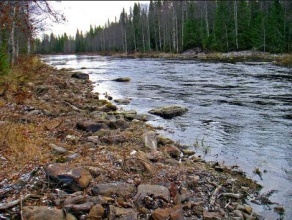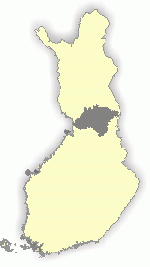Case study:Timber float restorations at River Iijoki
Jump to navigation
Jump to search
Location: 65° 19' 28.71" N, 25° 25' 40.83" E
Left click to look around in the map, and use the wheel of your mouse to zoom in and out.
Project overview
| Status | Complete |
|---|---|
| Project web site | http://www.ymparisto.fi/default.asp?node=5579&lan=fi |
| Themes | Fisheries, Habitat and biodiversity, Hydropower, Hydromorphology, Land use management - forestry |
| Country | Finland |
| Main contact forename | Timo |
| Main contact surname | Yrjänä |
| Main contact user ID | |
| Contact organisation | Centre for Economic Development, Transport and the Environment for North Ostrobothnia |
| Contact organisation web site | http://www.ymparisto.fi/default.asp?node=25563&lan=fi |
| Partner organisations | Metsähallitus (National Forestry Board) |
| This is a parent project encompassing the following projects |
Restoration of Kostonjoki River |
Project summary
Edit project overview to modify the project summary.
River Iijoki has been restored mainly because of altered river morphology caused by intensive forestry and timber floating. Besides the main channel of River Iijoki, also all tributaries of this large river area have been restored. The main channel of the river is mainly harnessed for hydro power production and also two tributaries are regulated.
Monitoring surveys and results
This case study hasn’t got any Monitoring survey and results, you can add some by editing the project overview.
Lessons learnt
This case study hasn’t got any lessons learnt, you can add some by editing the project overview.
Image gallery
|
Catchment and subcatchmentSelect a catchment/subcatchment
Catchment
Subcatchment
Site
Project background
Cost for project phases
Reasons for river restoration
Measures
MonitoringHydromorphological quality elements
Biological quality elements
Physico-chemical quality elements
Any other monitoring, e.g. social, economic
Monitoring documents
Additional documents and videos
Additional links and references
Supplementary InformationEdit Supplementary Information
| ||||||||||||||||||||||||||||||||||||||||||||||||||||||||||||||||||||||||||||||||||||||||||||||||||||||||||||||||||||||||||||||||||||||||||||||||||||||||||||||||||||||||||||||||||||||||||||||||||||||||||||||||||||||||||||||||||||||||||||||||||||||


